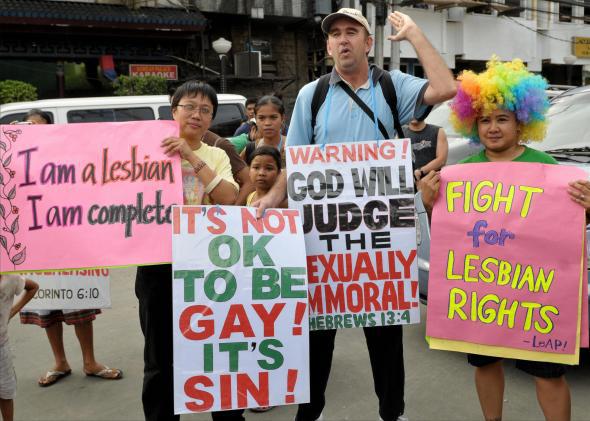At the end of October, the University of Notre Dame will host a two-day conference bearing a name that would have been unthinkable just a few years ago. “Gay in Christ” will feature Catholic speakers who self-identify as gay and lesbian, along with allies who are actively seeking more inclusive pastoral strategies for dealing with the LGBTQ faithful. The conference’s opening remarks and final presentation will be given by one of those allies, Professor John Cavadini, a former chair of Notre Dame’s department of theology who was appointed to the International Theological Commission, a select group that advises the pope and his bishops on theological matters, by Pope Benedict.
Signs and signals that the church may be shifting its position on homosexuality always make headlines, but behind the scenes, the church is actively searching for new ways to address LGBTQ issues. More often than not, church leaders turn to celibate gay Catholics to help them find a way forward. “There are a lot of people realizing that the condemning approach was not working and was not a good reflection of Christian love or charity,” Ron Belgau, who runs the celibate Christian blog Spiritual Friendship and is scheduled to speak at the Gay in Christ conference, told me. “A lot of people are interested in talking to celibate gays about [other approaches].” Although they don’t share all the values of secular LGBTQ activists, celibate gays serve as advocates for the worth and dignity of LGBTQ people and their relationships in a context where outside activists are still viewed with suspicion and hostility.
Let’s be clear, here—the recent softening of the Catholic Church’s position on homosexuality hasn’t happened in a vacuum. The church has opened itself to change because the general public’s attitudes have shifted so profoundly that its condemnation of gays has begun to seem heartless and out of touch. According to Belgau, “There’s beginning to be a realization that the same-sex marriage fight is a losing one, and Christians have made themselves look pretty bad in the process.” Celibate gays aren’t the ones responsible for these dramatic changes in Western culture—mainstream, secular gay activists and their liberal allies brought about those shifts. But outside pressure alone could never produce change in an institution that prides itself on maintaining moral steadfastness in a sinful, fallen world. The existence of people who continue to assert the reality and unchangingness of their orientation toward members of the same sex, even though they accept the church’s teachings on sexuality, make it harder to dismiss LGBTQ people outright, or to see orientation-change as the solution to the dilemma sexual minorities present.
Although celibacy may seem like an unpalatable choice for gay men and lesbians who seek healthy, loving, intimate romantic relationships, the differences between advocates for celibacy and those who once promoted orientation-change cannot be overstated. For as long as orientation-change was viewed as a viable option, gay men and lesbians could still be viewed within a framework of sinfulness and disobedience. “Ex-gay” activists and organizations were fully compatible with an odious anti-gay worldview that denied the lived experience of gays and lesbians, many of whom learned the hard way that no amount of prayer or therapy can change the object of one’s attraction. In contrast, celibate gays validate the stability of same-sex attraction throughout a lifetime, and by identifying themselves as gay or lesbian, they affirm the unique difficulties and challenges LGBTQ people face in a culture organized around heterosexual marriages and families.
Secular supporters of LGBTQ rights may well question whether we should care if the Catholic Church softens its position on homosexuality, since it’s clear that full acceptance of same-sex relationships is off the table. (My Outward colleague J. Bryan Lowder wondered just that recently on Slate.) But, with more than a billion Catholics worldwide, even a small shift toward compassion and tolerance could have dramatic and positive implications. For instance, young Catholics grappling with same-sex attraction might have a far easier time if the church stopped singling them out for condemnation and instead stressed the similarities between what is asked of them and the demands placed on their heterosexual peers. If the sexual sins of gay and lesbian Catholics were viewed on a par with the sexual sins of their heterosexual co-religionists, the question of whether celibacy is a positive, affirming lifestyle for the majority of adult gay Catholics could then be addressed without the added layer of guilt and blame that makes growing up gay so uniquely painful and isolating.
In parts of the world where strictures against homosexuality have taken the form of punitive laws and widespread anti-gay violence, the stakes are even higher. I’ve written previously about the ways pressure from Western LGBTQ organizations can backfire in those situations and of the need for more engaged, community-based approaches. The Catholic Church’s presence on the African continent is large and growing. Catholic charities have funded hospitals, schools, and undertaken many other good works in African communities. A Catholic Church that took a firm and vocal stand against homophobic violence and condemned laws that mandate prison time for sexual minorities would be an ally LGBTQ activists would be foolish to spurn.
While they stop well short of espousing a liberal political agenda, in these important areas at least, celibate queer Catholics share the concerns of secular gays and lesbians. “All of us were hurt by how our churches handled homosexuality when we were growing up. Just by being celibate, it doesn’t mean we think it’s OK to be taunted or hear constant condemnations from the pulpit,” explains Belgau. “We tend to have mainstream gay friends and don’t see them as unfamiliar invaders who are destroying the family.” The Christian community is looking to celibate gay people for guidance on the gay issue, and their input could lead to real improvements, particularly for the youngest and most vulnerable queer populations.
